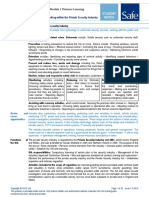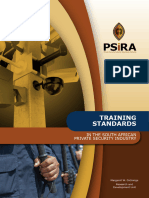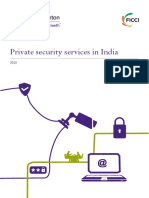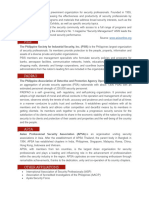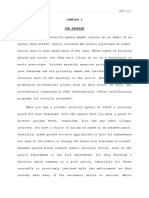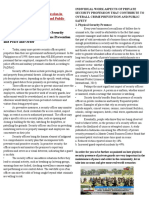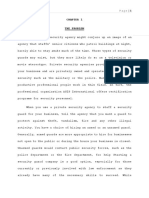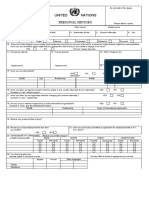Contents
Introduction...................................................................................................................... 2
Risks................................................................................................................................ 3
RISK ASSEMENT MATRIX.......................................................................................... 4
Risks.............................................................................................................................5
Overregulation..............................................................................................................5
High Inflation.................................................................................................................6
Competition.................................................................................................................. 7
Impact of Risks on Security companies...........................................................................8
Recommendations......................................................................................................... 12
Conclusion..................................................................................................................... 16
Reference List................................................................................................................17
1
�Introduction
As the demand for private security services continues to grow in response to rising
crime rates, political unrest, and technological threats, companies in the sector must
navigate an increasingly complex and dynamic risk environment. Linda Integrated
Security is a leading provider of professional security services, recognized for its
commitment to protecting clients through tailored and responsive solutions. Risk refers
to the possibility that events or conditions may occur that could negatively impact the
organization’s ability to achieve its goals (ISO 31000:2018). These risks can arise from
both internal and external sources and may affect various areas, including finance,
operations, reputation, compliance, and strategy. (PSIRA), The Private Security Industry
Regulatory Authority is designed to control the private security industry (psi) effectively
as well as preside over practising security companies. Their primary objective is to
promote ethical and professional legal standards; investigate complaints, register
security companies, and ensure compliance (PSIRA,2024). However, like many in the
industry, the company faces significant external risks that threaten its operations,
reputation, and long-term viability. These include cybersecurity breaches, shifting
regulatory requirements, economic instability, and public perception challenges. This
essay examines the impact of these external risks on Linda Integrated Security,
analysing how they affect its strategic and operational effectiveness. It also offers
practical recommendations to mitigate these threats, ensuring the company remains
resilient, competitive, and capable of fulfilling its mission in an evolving security
landscape. The discussion that follows will analyse the broader economic implications,
including the effects of regulation, inflation and competition, and will offer strategic
recommendations to ensure the long-term viability of private security companies in a
rapidly evolving landscape.
2
�Risks
South African security companies face key risks that affect their operations and
profitability. These include inflation, which increases costs; overregulation, which
imposes compliance burdens; and competition, which pressures pricing and market
share. Managing these risks is crucial for maintaining stability and achieving long-term
business success in the sector.
3
�RISK ASSEMENT MATRIX
Risk Likely hood Impact Risk level
1. Over High High High
regulation(PSIRA,
2024)(Mbane,et al,
2021)(Ngulube,
2022) (Scheelinck,
et al, 2020)
2. High High High High
inflation(Mbane,
et.al, 2021)
3. Competition(Mbane, High High High
2021) (Libera,
2024)
4. Corruption High Medium High
(Sithomola, 2024)
5. Political instability Medium High Medium
(Masondo,
webster, )
6. Cybercrime Low High Medium
threats(Ricci,S et al,
2021)
7. Strikes / Riots Low Medium Medium
(Tenza, 2020)
8. Reputational Medium High Medium
damage (Vassallo,
Seo and Ansari,
2024) (Tcherni-
Buzzeo, 2025, p. 3)
4
� (Al Guindy,
Naughton and
Riordan, 2023)
9. Evolving crime Low-medium Medium Low
trends (PWC, 2024)
(Tcherni-Buzzeo,
2025)
5
�Risks
Overregulation
We see high compliance Levies stemming from licensing, registration renewals and
training costs and see a duplication of legal requirements and costs across different
government departments. The National Bargaining Council (NBC) presides over all
labour councils to determine employee benefits and negotiate collective agreements.
Citing increases in minimum wage up to (R27.58); (UIF) unemployment fund at 1% of
remuneration; provident fund (5% of salary), and affinity health (hospital cover) at
(R172.5). The current collective bargaining agreement spans from the years 2023
ending in 2027 and it projects that security guard wages will increase at an average rate
of 7% per annum. The number of governing bodies collecting fees, gives rise to a
duplication of levies pressed upon each organisation, as seen in the (bargaining council
levy R7) and (PSIRA fee R4). (NBCPSS, 2023). Excessive fines and taxes were levied
to an industry with many SMMEs. Penalties for the grew from R14m-R25m. (PSIRA
Annual Report, 2024: 139)
Current regulators lack pro-active, and professional governing body guidelines (problem
exposition) (Khosa, 2021: 730) hence the (PSI) Private security industry is growing at a
rate quicker than PSIRA is expanding, so much so that it has not been able to fully
comprehend current and new entrants, and integrate a new and emerging market,
namely Cyber security, which is a subcategory of the 4th industrial revolution(4IR).
PSIRA more concerned with collecting registration fees than regulating it (Mbana,
Mofokeng, Maluleke, Khosa, 2021: 251; Ngulube, 2022: 65 a).
Pending legislation also threatens to numb the PSI as the Firearms Control Amendment
Bill hopes to disarm security personnel in a bid to reduce crime, citing that the number
of security guards outnumbers SAPS (South African Police Service) by a ratio
exceeding 1:4. Illegal possession of firearms is the cry by police minister Senzo
6
�Mchunu. Of 126’529 firearms in PSI 1’646 were either lost or stolen. In (2024-2025) 847
firearms were reported lost or stolen (Teixeira, 2025). “As of the fiscal year 2022/2023,
the South African Police Services recorded a total of 7,653 stolen firearms” (Cowling,
2024).
A move away from outsourcing PSC, has been a new trend in the for government
(public sector). This proposal is being pushed by political parties. Insourcing initiative is
aimed at employing guards directly as a means to cut costs (PSIRA, Draft strategic
plan, 2025: 35). The bulk of PSI is described as a guarding sector, operating with
people rather than digital services, so any factors that shrink the amount of active
personnel in the industry rather than employ, can be seen as a risk.
7
�High Inflation
Inflation can best be defined as a gradual spike in price levels as it patterns to good and
services in an economy (Odintsov, Oikonomou, Giannakoudi et. al, 2023). It has dire
effects within the private security industry due to the heavy reliance on human labour
and contractual agreements with clients. As part of the core services rendered by
security companies, operations such as surveillance, patrolling, emergency response, to
mention a few, are under a strict budget all the while maintaining a certain level of
service expectations. Due to inflation, many aspects of operations are impacted such
customer relations, staffing as well as equipment. Operation costs are the most
immediate and significant implication of high inflation. As a security company certain
items such as radios, uniforms, vehicles etc are imperative for operations to be optimal.
As inflation continues to soar, more finances are required to maintain certain levels of
service. A prime example that has been observed was the 38.06% increase in fuel as of
January 2020(Libera, 2024). Fuel is imperative as an operational resource for mobile
patrol services.
8
�Competition
As the largest PSI in Africa, boasting approximately 2,9 million security personnel
registered, only 608,000 are currently active reflecting a 20% participation rate. With
over 20’000 registered security companies and at least 16’453 currently active, (79%),
that reflects an increase of 102% active companies since 2014, with a 25% increase in
active personal since 2014. (PSIRA, 2024: 45-48). Industry competition is proportional
to the growth and maturity of the industry and can pose a risk to individual firms.
Changing pricing strategies to adapt to market conditions can have several implications.
Lower pricing will be employed as a means to penetrate consumer markets. Lower
liquidity means if any single client defaults or delays on payments, the business is
exposed financially. This can lead to loss in clientele as the business is unable to meet
minimum standards. An already compromised budget and affects day to day operations
and companies may later face insolvency, which then can lead to property seizure in
some cases.
9
�Impact of Risks on Security companies
The biggest impact will be on the bottom line. Diluted company profits can cause a
ripple effect on Wages being paid in a timely manner. Relations with employees will
begin to crumble because of late wage payments. In the face of high levies pressed
upon the organisation, loss in skilled labour will occur. Downsizing the labour-force will
be necessary, and there after the organisation will face non-compliance and, will
experience stagnation as labour unions squeeze the company is top heavy with
organised labour. Non-compliance fines will be levied, and legal fees will follow for
defaulting on bargaining agreement. The company will operate in an Informal capacity
with no oversight. (Ngulube,2022: 4-6). The framework offers no incentive for
compliance. Notable cases and companies that have made tabloids and been involved
in court cases as a result of the imposed levies are, Sidas security, Mabotwane security
and Mofoko security patrols. (Ledwaba, 2023; Sidas, 2021; Mabotwane, 2024).
As far as Insourcing goes, it is another sensitive topic that if implemented fully can
decimate the security industry, SMEs especially, as they look to become empowered
through BEE initiative, yet are met with gruelling industry politics. Companies have seen
security personal absorbed by universities, and it is a party of a bigger initiative also to
be done by municipalities namely City of Johannesburg (PSA, 2025: 2).
While PSIRA lag in terms of developing understandings for 4IR, Linda will experience a
loss in the market share of the cybersecurity space. The evolving nature of crime puts a
strain on companies because they must adapt their training methods from physical
security to then gain IT knowledge and change scouting regiments for HR recruiters in
the organisation (Scheelinck, et al, 2020).
10
�A total wipe-out of the organisation will occur as a result of the enactment of the
proposed firearm amendment bill. The confidence to perform effective services will wilt
(consumers and guards). The most vulnerable operation will be the CIT cash-in-transit
operation as guards are not able to carry their automatic rifles, they will be at a
disadvantage when facing criminals armed to the teeth as the enactment of the law will
not disturb criminal entities. Self-defence will not be possible for guards engaged in
emergency reaction operations. Failure to discharge duties, will lead to a loss in
reputation (Proposed Regulations, 2025).
Material costs, labour and wage costs have also affected the operational budget or
security companies. Security guard usually earn fairly modest salaries. As an integral
part of the company security guards being underpaid will result in reduced morale and a
much lower level of productivity. Furthermore, this may also lead to strikes within the
security guard union. A keynote to observe is the implementation of a 4-year salary
agreement which was signed in March 2023(NBCPSS, 2023). This agreement
stipulates a 13% salary increment during the first year. Thereafter, a 6.5% and 7.5%
increment in during the course of two years (NBCPSS, 2023).
To cope with inflation, some companies may cut costs by reducing staff, delaying
equipment upgrades, or minimizing training programs. However, such cuts can
compromise the quality and effectiveness of security services. Understaffed posts,
poorly maintained equipment, and untrained personnel increase the risk of security
breaches and damage the company's reputation. The quality of services is another area
that suffers. In an attempt to control costs, companies may reduce training, delay
equipment upgrades, or lower staffing levels. This compromises the effectiveness of
their operations and can lead to security lapses, reputational damage, and client
dissatisfaction.
Contractual constraints further complicate the situation. Most private security companies
operate under long-term contracts with fixed rates. These contracts do not always
account for inflation, which means companies are often stuck providing services at
prices that no longer reflect their rising costs. As a result, profit margins shrink, and in
11
�extreme cases, companies may operate at a loss. Furthermore, clients who are also
affected by inflation may be unwilling or unable to accept rate increases, putting
additional pressure on the security company’s financial stability (Mbana, Khosa,
Mofokeng et. al, 2021).
Financial woes create an unpredictable employment atmosphere where a business can
begin to lose skilled labourers who are the backbone of the company because they’re
poached by companies that can give them stable and consistent wages. A high turnover
rate is costly when it comes to time and resources because a business can incur re-
training fees. In addition, a change in guards can affect important client relationships
with the company and disturb cohesion. In these conditions unethical practices prevail.
Companies compromise training budgets. Its’ in this environment that staff are more
likely to commit fraud, or theft or both, to clients and the business itself (Joseph, 2025).
Lacklustre services now characterise the business which decreases the perceived value
even further. Inferior service offerings lead to poor external performance reviews from
clients and can cause blacklisting from high value clients such as government
institutions and the private sector which can consists of multinational corporations.
In such a large market, all companies under the PSIRA umbrella are pegged in a sense
that the action of one can organisation can greatly influence the perception of the
industry as a whole. In a country which is already infamous for corruption, all
stakeholders stand to receive backlash when one company might bribe officials for
contracts, intimidate clients or operate while unregistered. It fosters distrust between
partners like SAPS and the public at large. Incidents like Thabo bester escaping prison
leave a negative imprint on the public perception (Erasmus, 2023, Ex SANDF, 2024).
Due to weak enforcement from PSIRA, a non-compliant company may operate with
impunity, which can impact companies which are complying negatively. Psira as a result
of so much expansion in the industry loses a grip on keeping up with their prescribed
standards. Compliance is measured through number of investigations conducted and in
12
�2021-2022 there’s a 20% disparity as compared to the previous year. We also notice a
4% decrease in finalized investigations in 2024 compared to the previous year. We look
at this as a means to measure enforcement of prescribed PSIRA guidelines. (PSIRA
Annual Report, 2024: 15-16; 60-64).
13
�Recommendations
Joining a Stakeholder organisation similar to (SASA), to open dialogue regarding
duplicated levies and other complaints. Being a part of an independent organisation
gives legitimacy to your company. Future concerns will address both the insourcing that
government is proposing, and it will assist. A self-regulating element will form as
employers should confront each other about their conduct and ethical standard to
address subjects such as missing firearms. Consider the British Security Industry
Association (BSIA), this association is characterised by being privately controlled, they
excel in helping negotiate fees, promote ethical conduct and have pushed the envelope
in remote monitoring while still maintaining employment. (BSIA, 2025)
A risk management (RM) and innovation department should be created, this division will
employ pro-active tactics to always be ahead in terms of skills-exchange with foreign
companies in the cyber space. Partake in a skills development activity, seen on the
youth development programme (PSIRA, Annual report, 2024: 42-44), this will further the
company’s agenda to receive tax reprieves and investments from agencies such as the
department of trade and industry. The RM department will look to hire talent from
abroad to educate current employees on how to navigate the cyber space. A proactive
way to shift company focus on the digital industry is to partner with SOE create reward
programmes for less fortunate bright students so get financing. Running pilot projects
for new innovations whereby equity is shared with investors will prop the company
upwards. Strategic Public–Private Security Partnerships (PPPs), this includes getting
tax-breaks or incentives, bursaries for long serving employees to skill retention. (PSIRA
Annual report, 2024: 119). Fidelity and ADT partnered up to put up surveillance using
technology in favour of guards (Fidelity, 2020). Strategic Public–Private Security
Partnerships (PPPs), this includes getting tax-breaks or incentives, bursaries for long
serving employees to skill retention. (PSIRA Annual report, 2024: 119)
In order to retain the skilled labour retention, reward programmes for performance and
loyalty bonuses should be imposed (Sambu, 2023: 179).
14
�Digital transformation with a long-term implementation plan to train and essentially
replace old workforce with a new dynamic labour force that will not only cause less
troubles in terms of organised labour but will open opportunity to new market share
opportunities locally and internationally. Advocacy for adequate training (Mbana, et.al,
2021: 1410)
Employ a robust risk management division that consists of employees who have worked
for the regulators to garner a smoother objection process and reduction in fines. Finally,
a company should invest in staunch legal teams.
To address these challenges, private security companies must adopt a proactive and
adaptive approach. One of the most important strategies is revising pricing models.
Companies should negotiate inflation-adjustment clauses in their contracts, allowing for
periodic price reviews based on official inflation rates. This ensures that revenue keeps
pace with rising expenses, helping maintain profitability and service standards.
Companies should educate clients about how inflation affects service delivery and
emphasize the value of professional security in protecting their assets. Building strong
client relationships can make it easier to negotiate necessary price adjustments.
Investing in technology is another key solution. Security firms can reduce their reliance
on manpower by integrating automated systems such as CCTV, biometric access
controls, drones, and AI-powered monitoring tools. While the initial investment may be
high, these technologies can lower long-term operating costs and enhance service
quality. Offering a wider range of services—such as cybersecurity, event security, or
consulting—can create additional income sources.
Diversification can make the company more resilient to economic fluctuations and
client-specific financial pressures. Automation and smart security technologies—such as
remote monitoring systems, AI-driven surveillance, and drones—can reduce reliance on
labour while improving efficiency (Mbana, Khosa, Mofokeng et. al, 2021). Although the
initial investment may be high, these technologies can offer cost savings and enhance
service delivery in the long run.
15
�Improving employee retention is equally important. Companies can offer competitive
wages, but they should also focus on non-monetary benefits such as professional
development, recognition programs, flexible shifts, and clear career paths. A motivated
and stable workforce reduces turnover and recruitment costs while improving service
reliability. Offering non-monetary incentives like training, professional development,
career progression, and flexible working hours can help retain staff without incurring
significant costs.
Where possible, modest salary increases or bonuses tied to performance can also
improve morale and reduce turnover. Optimizing schedules, reduce overtime, and
consolidate patrol routes to lower fuel and labour costs. Outsourcing non-core functions
like payroll or IT support can also help reduce overhead.
(CRM) client relationship management would be paramount for client retention
purposes; this would also help get the company good references and
recommendations. It would also help a company gain better understanding of their
clients’ preferences. Service differentiation is important to stand out, adding a cyber
security arm to the business as well as the latest surveillance methods such as body
cameras ‘A report showed that implementing body cameras resulted in a 14.3%
decrease in complaints against officers, with no complaints reported against those using
head-mounted cameras.” (El dorado,2025 ; Pillay, 2023:19) coupled with marketing
strategies such as advertising will establish any organisation as a prominent service
provider. Cyber security as a way to gain competitive advantage because business
leaders have heightened focus on it (Amra, 2024). The above-mentioned additions to
the business help justify any price increases that might prevail as the company shift
towards a new niche market.
Team building initiatives and regular and advanced training courses (cyber security) or
how to pilot drones help employees buy into top managements vision of rebranding.
These give employees a sense of ownership, employees also then realise the symbiotic
16
�nature of the business-employee relationship. When staff buy into the company brand,
they can then become a staunch advocate or ambassador for the organisation. Building
a strong brand is a deterrent against negative reputational incursions arising from
industry reputational let downs and gives clients satisfaction as they believe their money
is well spent. ‘’ PSIRA should increase the national footprint of training centers in the
country in order to improve accessibility to prospective persons interested in a career
in the PSI” (Mbane, et.al, 2021: 1411b).
17
�Conclusion
The private security industry in South Africa, with Linda Integrated Security as a case
in point, stands at a crossroads, facing a convergence of external risks that threaten
its stability, competitiveness, and capacity to deliver essential protection services.
Excessive regulation, overlapping levies, economic inflation, shrinking profit margins,
increasing labour costs, legislative uncertainty, and the looming shift toward insourcing
collectively place immense pressure on security firms—particularly SMMEs. Moreover,
PSIRA’s regulatory lag, especially in the digital domain, leaves security providers
vulnerable in a fast-evolving threat landscape, while fierce competition further erodes
margins and fuels unethical practices.
Despite these daunting challenges, Linda Integrated Security can pursue a path of
resilience and innovation through proactive reform and strategic repositioning. By
joining industry associations, investing in risk management and legal infrastructure,
adopting digital technologies, and forging strong public-private partnerships, the
company can both mitigate external threats and unlock new opportunities in emerging
markets like cybersecurity. Simultaneously, developing robust employee retention
programs and shifting toward a tech-enabled service model will strengthen internal
capacity and market appeal.
Ultimately, sustainability in the private security sector will depend on the industry’s
ability to self-regulate, adapt to the Fourth Industrial Revolution, and advocate for
more effective, streamlined oversight. For Linda Integrated Security, the adoption of
forward-thinking strategies and stronger stakeholder engagement will be critical to
navigating the current landscape and shaping a future in which security services are
not only viable, but vital, trusted, and transformative.
18
�Reference List
Al Guindy, M., Naughton, J.P. & Riordan, R. (2023) ‘Social media disclosure and reputational
damage’, Review of Quantitative Finance and Accounting, 60(3), pp. 1–30. Available at:
https://doi.org/10.1007/s11156-023-01239-z
Amra, J. (2024) Cybersecurity - South Africa: Statista market forecast, Statista. [Accessed 29
April 2025] www.statista.com/outlook/tmo/cybersecurity/south-africa
Body cams and drones in security: Advantages and legal risks (2025) El Dorado Insurance
Agency, INC. [Accessed on 27 April 2025] www.eldoradoinsurance.com/security-industry-
news/body-cams-and-drones-in-security/#:~:text=A%20report%20showed%20that
%20implementing,those%20using%20head%2Dmounted%20cameras
BSIA (2025) British Security Industry Association [Accessed 25 April 2025] www.bsia.co.uk/who-
we-are
Cowling, N (2024) South Africa: Firearms reported as stolen 2022/2023, Statista. [Accessed 25
april 2025] www.statista.com/statistics/1461980/number-of-stolen-and-lost-firearms-reported-
in-south-africa/#:~:text=As%20of%20the%20fiscal%20year,with%20just%20over
%202%2C400%20reports
Erasmus, D. (2023) Thabo Bester Saga: Correctional services terminates G4S Mangaung
contract, The Mail & Guardian.[Accessed on 25 April 2025] mg.co.za/news/2023-05-02-thabo-
bester-saga-correctional-services-terminates-g4s-mangaung-contract/
Ex-SANDF chief’s R95.5 million transnet security contract under scrutiny (no date) Online
Tenders [Accessed on 24 April 2025] www.onlinetenders.co.za/news/ex-sandf-chiefs-r955m-
transnet-security-contract-under-scrutiny
Fidelity ADT (2020) Fidelity Adt & Vumacam join forces to place an eye on crime. [Accessed 25
April 2025] www.adt.co.za/fidelity-adt-and-vumacam-join-forces-to-place-an-eye-on-crime/
from South Africa, Kenya and Tanzania, Asian Journal of Social Science and Management
Technology [Accessed 25 April 2025] https://ajssmt.com/Papers/56171182.pdf
https://businesstech.co.za/news/lifestyle/788559/how-much-more-youre-paying-for-petrol-
electricity-and-food-in-south-africa-vs-a-year-ago/#:~:text=In%202019%2C%20the%20price
%20of,a%2045.2%25%20increase%20in%20price.
https://nbcpss.org.za/wp-content/uploads/2023/02/Illustrative-Pricing-Guide-2023-2027.pdf
ISO 31000:2018, Risk management – Guidelines. International Organization for Standardization.
Available at: https://www.iso.org/standard/65694.html [Accessed 5 May 2025].
19
�Joseph, J.B. and R. (2025) Forestry Department awarded R140-million tender to dodgy security
company, GroundUp News [Accessed on 29 April 2025] https://groundup.org.za/article/dffe-
awarded-dodgy-tender-worth-over-r140-million-to-security-company/
Khosa, D. (2021) Technium Social Science Journal, Academia. [Accessed on 27 April 2025]
www.academia.edu/117280759/Exploring_hindrances_for_professionalising_South_African_Pri
vate_Security_Industry_Experiences_and_recommendations
Ledwaba, L (2023) Security guards battle late salary payments, unpaid medaid benefits, Daily
Maverick. [Accessed 27 April 2025] www.dailymaverick.co.za/article/2023-04-21-security-
guards-battle-late-salary-payments-unpaid-medaid-benefits/
Mabotwane Security Services vs Madibeng Local Municipality(2024) SAFLII [Accessed 25 April
2025] www.saflii.org/za/cases/ZAGPPHC/2024/528.html
Masondo, T, Webster, E(2018) A south african case study [ accessed on 28 April 2025]
https://doi.org/10.1177/0143831X18772185
Mbana, L, Mofokeng, JT, Maluleke, W, Khosa, D (2021)Sharpening the Axe: Identifying and
Closing Gaps Within the Training Space of the South African Private Security Industry
International Journal of Criminology and Sociology, 2021, 10 [Accessed on April 30 2025]
https://www.academia.edu/117280788/Sharpening_the_Axe_Identifying_and_Closing_Gaps_
Within_the_Training_Space_of_the_South_African_Private_Security_Industry
Mbana, L, Prof Dr. Mofokeng, JT, Prof Dr, Maluleke, W, Khosa, D (2021) The adverse effects of
the rise of unscrupulous security service providers on
Mbana, L., Khosa, D., Mofokeng, J. T. and Maluleke, W. (2021) “Exploring hindrances for
professionalising South African Private Security Industry: Experiences and
recommendations”, Technium Social Sciences Journal. Constanta, Romania, 26(1), pp. 728–741.
doi: 10.47577/tssj.v26i1.5010.
Ngulube, LSJ (2022) Analysis of Private Security Companies to the Private Security Industry’s
Regulatory Framework in Gauteng, South Africa. Masters of Arts, University of South Africa
https://uir.unisa.ac.za/server/api/core/bitstreams/2d91438f-05c3-46e9-b9dd-6b190996bac0/
content
Nicolas, M.L.D., Desroziers, A., Caccioli, F. & Aste, T. (2023) ‘ESG reputation risk matters: An
event study based on social media data’, arXiv preprint, arXiv:2307.11571. Available at:
https://arxiv.org/abs/2307.11571
Odintsov, S.D., Oikonomou, V.K., Giannakoudi, I., Fronimos, F.P. and Lymperiadou, E.C., 2023.
Recent advances in inflation. Symmetry, 15(9), p.1701.
20
�Pillay, K The Private Security Industry in South Africa a Force to be Reckoned with: Reality or
Rhetoric? (2023):19 https://uir.unisa.ac.za/server/api/core/bitstreams/5029e63b-2cdf-4037-
b494-0697c82e9a78/content PhD, UNISA
Private Security Industry Regulatory Authority (2024) Annual Report [Accessed 25 April 2025]
https://www.psira.co.za/dmdocuments/PSiRA%20-%20Annual%20Report%202023-24.pdf
Proposed Regulations ‘will severely hamper’ Security Firms’ ability to operate (2025) Moon
Information Refinery [Accessed 25 April 2025] www.moonstone.co.za/proposed-regulations-
will-severely-hamper-security-firms-ability-to-operate/
PSA(2025) Insourcing vs Outsourcing [Accessed 30 April 2025]
https://www.psa.co.za/docs/default-source/psa-documents/psa-opinion/insourcing-versus-
outsourcing---psa-perspective.pdf?sfvrsn=47a54b21_0
PSIRA(2024) PSIRA Annnual Report [Accessed on 25 april 2025]
www.psira.co.za/dmdocuments/PSiRA%20-%20Annual%20Report%202023-24.pdf
PSIRSA,(2025) Draft Strategic Plan 2025-2030 [Accessed on 29 April 2025]
https://static.pmg.org.za/STRAT_2025-2026.pdf
Sambu, E (2023), Regulating Private Security Industry: Experience
Scheerlinck, G., Buts, C., Cools, M. et al. The impact of regulation on private security industry
dynamics. Eur J Law Econ 50, 223–240 (2020). https://doi.org/10.1007/s10657-020-09663-5
Schrieber, S. (2023) Four years after Tshwane promised to hire 4,000 security guards many
endure hopeless wait, TimesLIVE. [Accessed on 28 April 2025] www.timeslive.co.za/news/south-
africa/2023-05-25-four-years-after-tshwane-promised-to-hire-4000-security-guards-many-
endure-hopeless-wait/
Sidas Security vs CCMA and others (2024) SAFLII [Accessed: 25 April 2025]
Sithomola(2024) The Public Sector’s Futile Fight Against Corruption [Accessed on 24 April 2025]
https://doi.org/10.61967/adminpub.2024.32.3.5
Tcherni-Buzzeo, J. (2025) 'The crime drop in South Africa: an exploratory research note', Security
Journal, 38(14). Available at: https://link.springer.com/article/10.1057/s41284-024-00459-9
(Accessed: 5 May 2025)
Teixeira, R. (2025) South African private security industry faces scrutiny over firearm losses,
ProtectionWeb [accessed 25 April 2025] www.protectionweb.co.za/featured/south-african-
private-security-industry-faces-scrutiny-over-firearm-losses/
21
�Tenza, M (2021) The effects of violent strikes on the economy of a developing country : a case of
South Africa [Accessed on 25 April 2025] https://journals.co.za/doi/abs/10.10520/ejc-obiter-
v41-n3-a4
the private security industry. European Journal of Economics, Law and Social Sciences [Accessed
25 April 2025] https://iipccl.org/wp-content/uploads/2021/10/020.pdf
Vassallo, J.P., Seo, Y. & Ansari, S. (2024) ‘Reputation-damaging events over a long time horizon:
An event-system model of substantive reputation repair’, Journal of Management Studies, 61(2),
pp. 342–370. Available at: https://doi.org/10.1177/01492063231224353
www.saflii.org/za/cases/ZALCPE/2021/10.html
22




